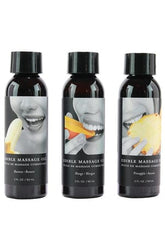Understanding the Different Types of Lubricants: Uses, Benefits, and When to Avoid
Intimate lubricants can enhance pleasure, reduce discomfort, and add excitement to sexual activities. With various formulations available, choosing the right lubricant for your needs can make a significant difference in comfort and satisfaction. Here’s a comprehensive guide to different types of lubricants, their ideal uses, and situations where they may not be suitable.
Water-Based Lubricants
Water-based lubricants are among the most popular and versatile choices available. They’re formulated with water as the main ingredient, giving them a lightweight, non-greasy feel that’s easy to wash off. These lubricants come in various options, including flavored, warming, and even cooling varieties.
Best For:
- Vaginal and Anal Sex: Water-based lubricants are compatible with all types of condoms and sex toys, making them a safe choice for most sexual activities.
- Solo Play: Ideal for use with sex toys because they don’t degrade silicone or latex materials.
- Sensitive Skin: Many water-based lubricants are hypoallergenic and free from irritants, making them suitable for sensitive skin.
Pros:
- Easy to clean and won’t stain fabrics.
- Safe to use with latex and silicone products.
- Widely available in various formulations.
Cons:
- Dries out faster than other types, which may require reapplication.
- Some formulas may contain glycerin, which can cause irritation or yeast infections in sensitive individuals.
Avoid When: You’re looking for a lubricant that lasts a long time without needing reapplication. For prolonged sessions or underwater activities, other types of lubricants may perform better.
Silicone-Based Lubricants
Silicone-based lubricants are thicker and longer-lasting than water-based options, making them ideal for activities that require a bit more staying power. Silicone-based lubes are slick and smooth, often recommended for more intense or prolonged intimate sessions.
Best For:
- Anal Play: The thicker texture of silicone-based lubes is ideal for anal sex, as it provides longer-lasting lubrication and reduces friction.
- Water Play: Because they are water-resistant, silicone lubes are perfect for use in the shower, bath, or other water-based activities.
- Extended Sessions: Silicone lube doesn’t evaporate as quickly as water-based lube, making it great for activities that might take a bit more time.
Pros:
- Long-lasting and doesn’t require frequent reapplication.
- Waterproof, making it ideal for wet environments.
- Doesn’t dry out as quickly, so a little goes a long way.
Cons:
- Harder to wash off and can stain certain fabrics.
- Generally not compatible with silicone sex toys, as it can degrade the material over time.
Avoid When: Using silicone-based toys, as the lubricant can break down the silicone material, leading to wear and tear. If you need a lubricant that’s easy to clean, silicone-based products may feel too heavy or leave residue.
Oil-Based Lubricants
Oil-based lubricants are often made from natural oils like coconut oil, shea butter, or other plant-based oils. These lubricants are known for their luxurious feel and moisturizing properties, but they come with certain limitations.
Best For:
- Solo Play: Oil-based lubes are suitable for masturbation and external stimulation.
- Massage and Intimacy: Because they’re often thicker and moisturizing, they’re great for sensual massages.
- Moisturizing: Natural oil-based options like coconut oil can help with dryness, making them beneficial for those looking for lubrication with added hydration.
Pros:
- Long-lasting and doesn’t require reapplication.
- Provides a smooth, thick feel that can enhance certain types of touch.
- Many are made from natural ingredients, which can be gentle on the skin.
Cons:
- Not compatible with latex condoms, as oil weakens latex, leading to breakage.
- Can be harder to clean and may leave stains on fabrics.
- Not always pH-balanced, which can cause vaginal irritation or infection.
Avoid When: Using latex condoms or latex toys, as oil degrades latex and makes it less effective. Oil-based lubes should also be avoided if you’re prone to yeast infections, as some oils can cause imbalances in vaginal pH.
Hybrid Lubricants
Hybrid lubricants are a mix of water-based and silicone-based formulas, combining the easy-to-clean properties of water-based lubricants with the longer-lasting qualities of silicone-based ones. These lubricants provide a middle ground for users looking for versatility and extended lubrication.
Best For:
- Versatile Use: Hybrid lubricants work well for both vaginal and anal sex.
- Longer Sessions: The silicone component provides added staying power, making hybrid lubes ideal for those who want the benefits of both water and silicone lubes.
Pros:
- Offers the easy clean-up of water-based lubes with the staying power of silicone-based lubes.
- Safe with most types of condoms and some toys (always check product instructions).
Cons:
- May not be safe with silicone toys, as they still contain some silicone.
- May still require some reapplication during extended sessions.
Avoid When: Using high-quality silicone toys, as hybrid lubricants may degrade the material over time. Check the compatibility of your toys before using a hybrid lubricant.
Natural or Organic Lubricants
For those who prioritize natural or organic products, there are many lubricants made from organic, body-safe ingredients. These lubes are often free from synthetic additives, parabens, and fragrances, making them a popular choice for those with sensitive skin or allergies.
Best For:
- Sensitive Skin: Free from additives and harsh chemicals, making them ideal for those with sensitivities.
- Eco-Conscious Users: Natural lubricants are often eco-friendly and cruelty-free.
Pros:
- Made with natural ingredients and fewer synthetic additives.
- Often pH-balanced and gentle on sensitive areas.
Cons:
- Can be more expensive than other types of lubes.
- May have a shorter shelf life or require refrigeration.
Avoid When: You need a lube for longer-lasting sessions, as natural lubes may dry out more quickly. Some natural lubricants also contain oils that are not compatible with latex condoms.

